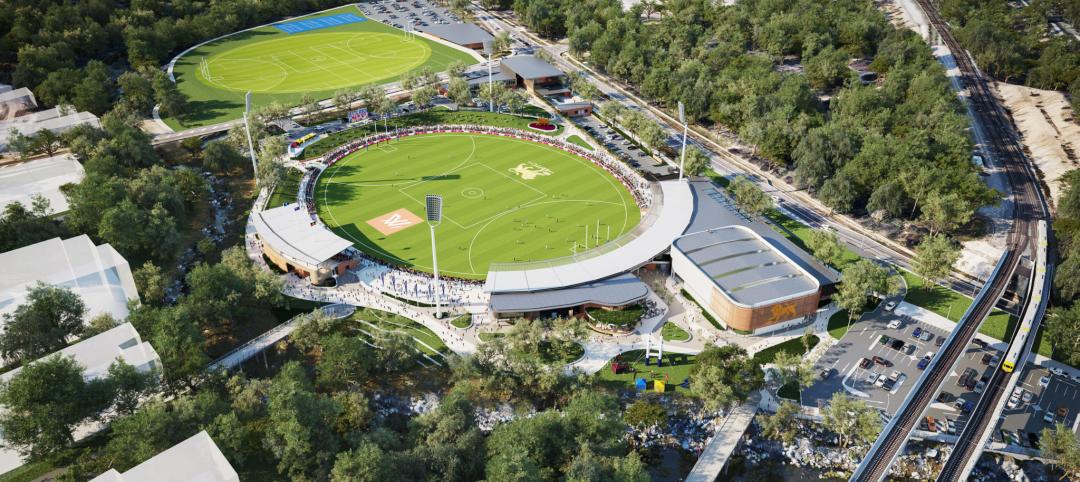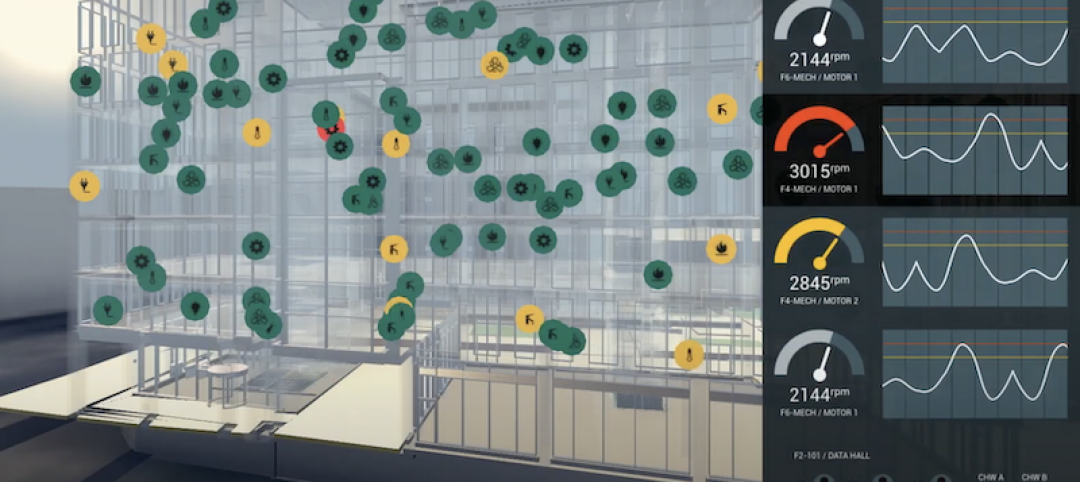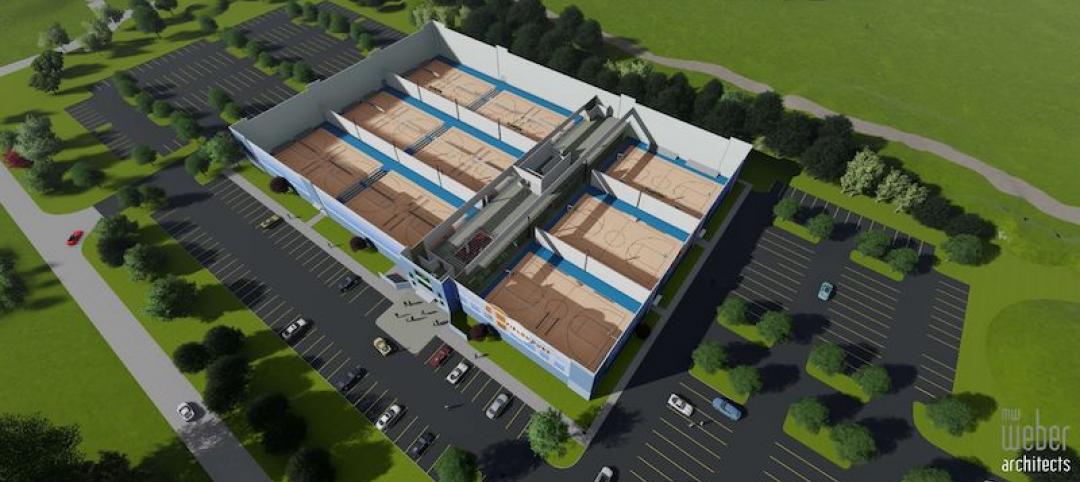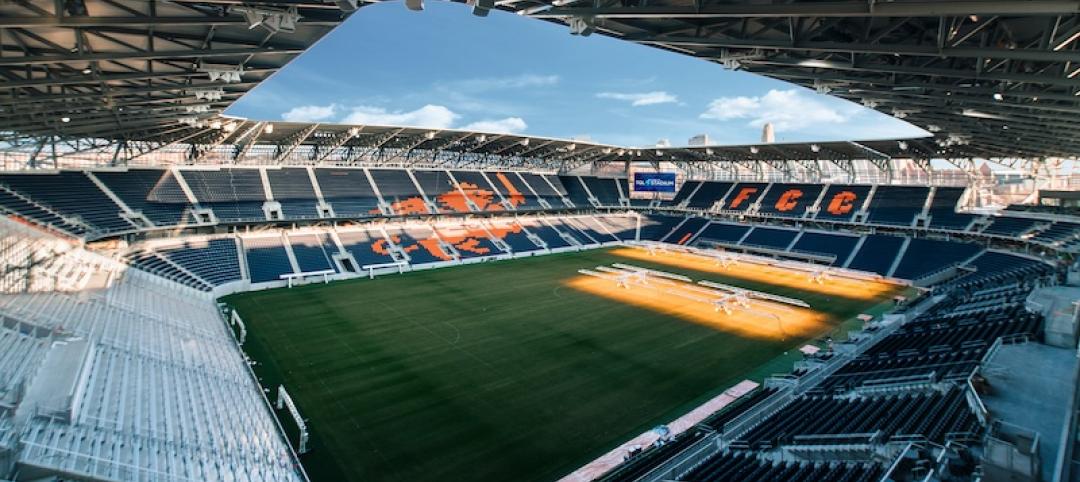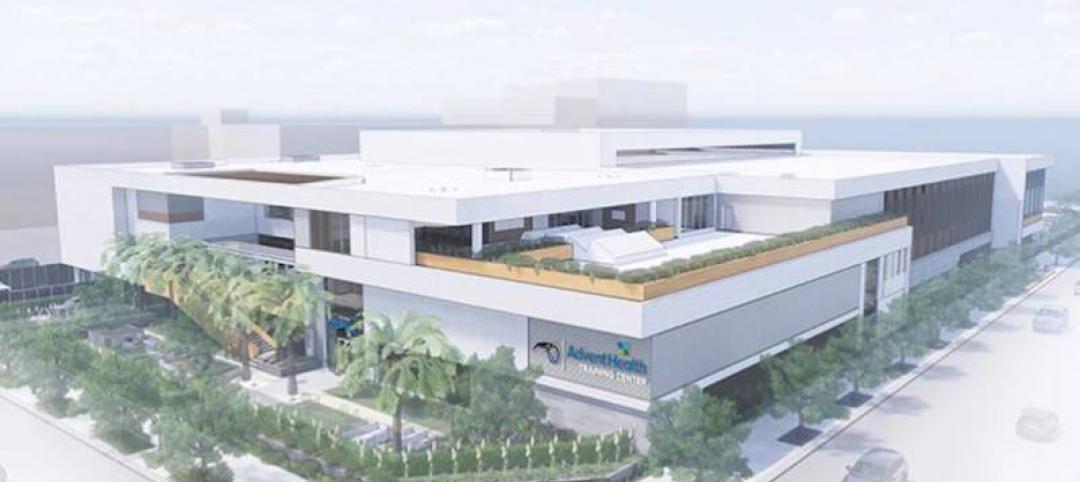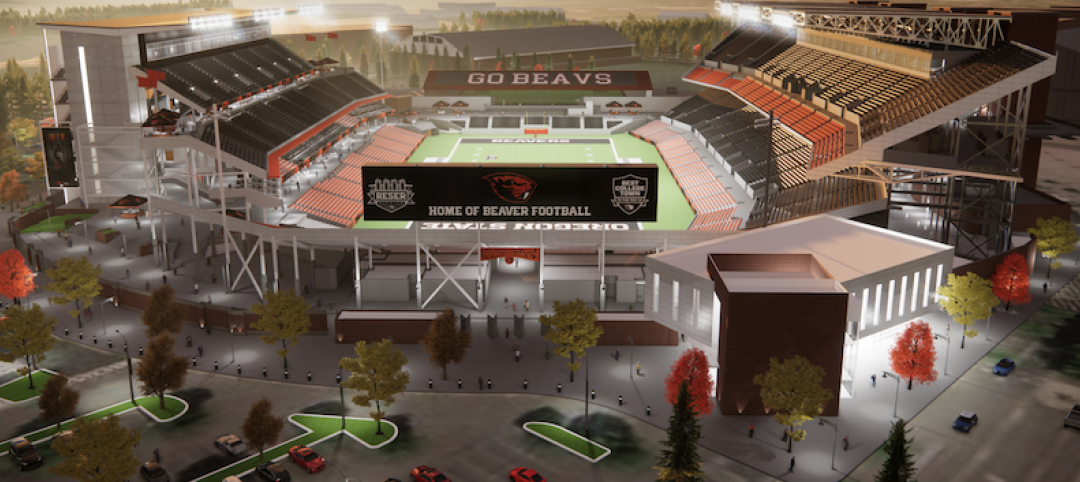As the 2022 NFL season kicks off, one of the league’s original franchises is solidifying plans to leave its landmark lakefront stadium for a multi-billion-dollar mixed-use stadium district in northwest suburban Arlington Heights, Ill.
The Chicago Bears, on Tuesday, released renderings that depict a preliminary master plan for the 326-acre property, the former home of the Arlington International Racecourse. The team, last September, signed a $197.2 million agreement to purchase the land from Churchill Downs Inc. The Bears have yet to close on the property.
The prelim master plan, by architecture firm Hart Howerton, features a 206-acre transit-oriented entertainment and mixed-use district situated on the southeast half of the property, with the 120-acre stadium district on the west side. Water features, tree-lined walking paths, and greenery separate the two districts. Initial plans call for multifamily residential, restaurants, bars, a hotel, and commercial/retail components, with walking access to the stadium and the existing Metra Arlington Park train station.
In an open letter to the public posted on Tuesday, Bears officials unveiled their vision for the project: “a multi-purpose entertainment district anchored by a new, best-in-class enclosed stadium, providing Chicagoland with a new home worthy of hosting global events such as the Super Bowl, College Football Playoffs, and Final Four.” In the same letter, the team noted that the property deal is not yet a sure thing, and that “there are conditions that must be met in order to be in a position to close,” and: “If we do close on the property, it does not guarantee we will develop it.”
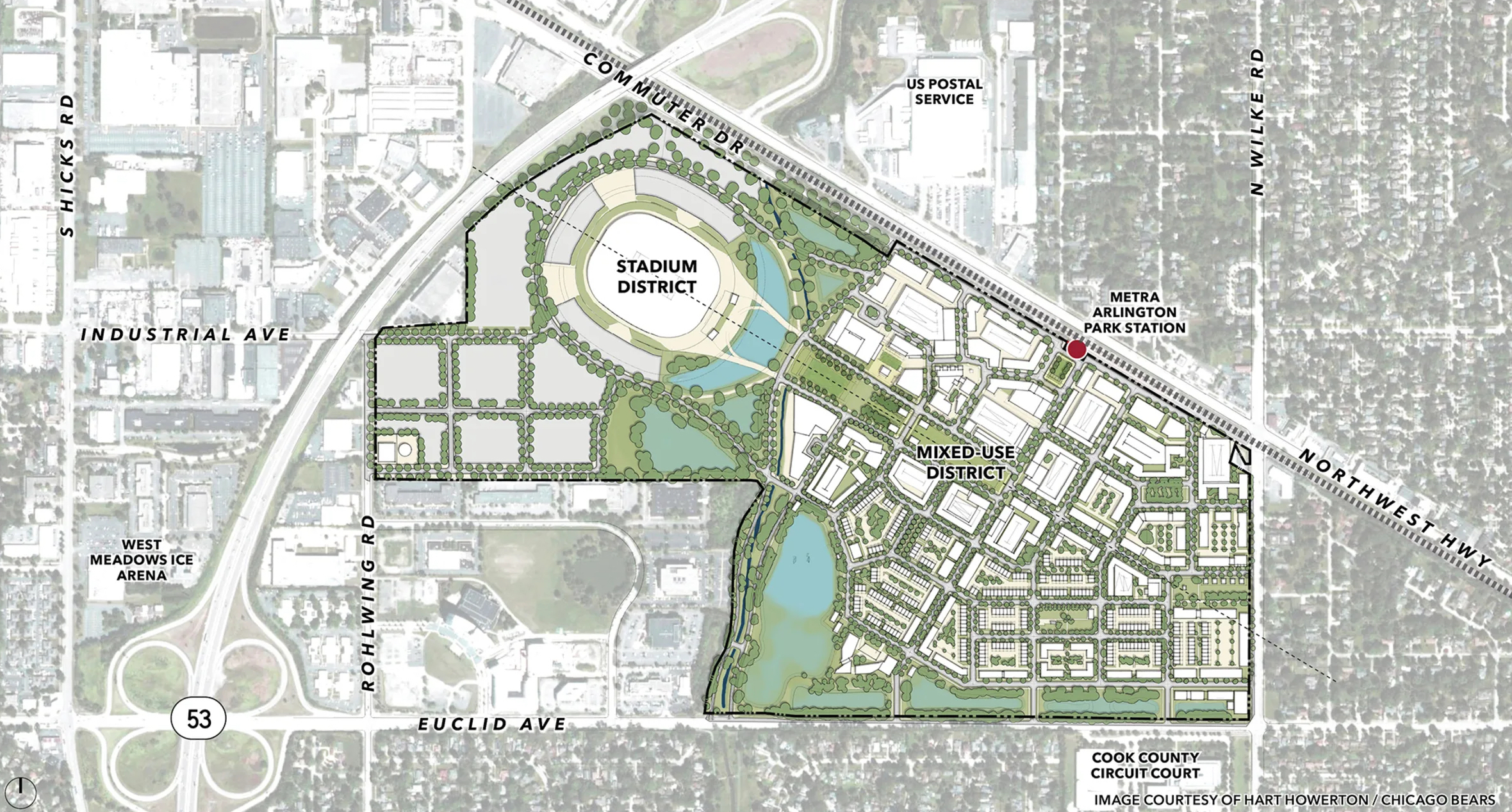
In the meantime, the team has cut off discussions with the city of Chicago related to renovating Soldier Field, even as city officials push for a possible deal to keep the Bears in Chicago. In July, the city, in partnership with a development team, released three design concepts for upgrading Soldier Field, including a domed stadium plan that would cost $2 billion.
The Bears, in the open letter, stated that while under contract with Churchill Downs, the team would not explore alternative stadium sites or opportunities. In short, while a deal is not 100% certain, it appears more likely that the Bears will be packing their bags for Arlington Heights within the next decade.
Why would the Chicago Bears leave Chicago?
There are several motivations for leaving Chicago. For one, the Bears do not own Soldier Field; the city does. Under the current Soldier Field contract, which runs through 2033, the franchise must share sizable revenues with the city and must rely on the Chicago Park District for maintenance of the property. Field conditions have been an ongoing issue for the team and NFL league officials, as have event schedule conflicts, parking capacity, accessibility, the overall fan experience.
Secondly, with a capacity of just 61,500, Soldier Field is the smallest stadium in the NFL, with nearly 20,000 fewer seats than Dallas Cowboys’ AT&T Stadium and 21,000 fewer seats than MetLife Stadium, home of the New York Giants and Jets.
ALSO SEE: Chicago proposes three options for Soldier Field renovation including domed stadium
The biggest motivation, perhaps, is the unrealized revenue potential for one of the world’s most valuable sports franchises ($5.8 billion, No. 6 on Forbes’ World’s 50 Most Valuable Sports Teams 2022). The Bears have watched other sports organizations—Atlanta Braves, Chicago Cubs, Green Bay Packers, Milwaukee Bucks, to name a few—cash in on private and public-private sports-anchored entertainment districts that draw year-round crowds and create a more diverse revenue model.
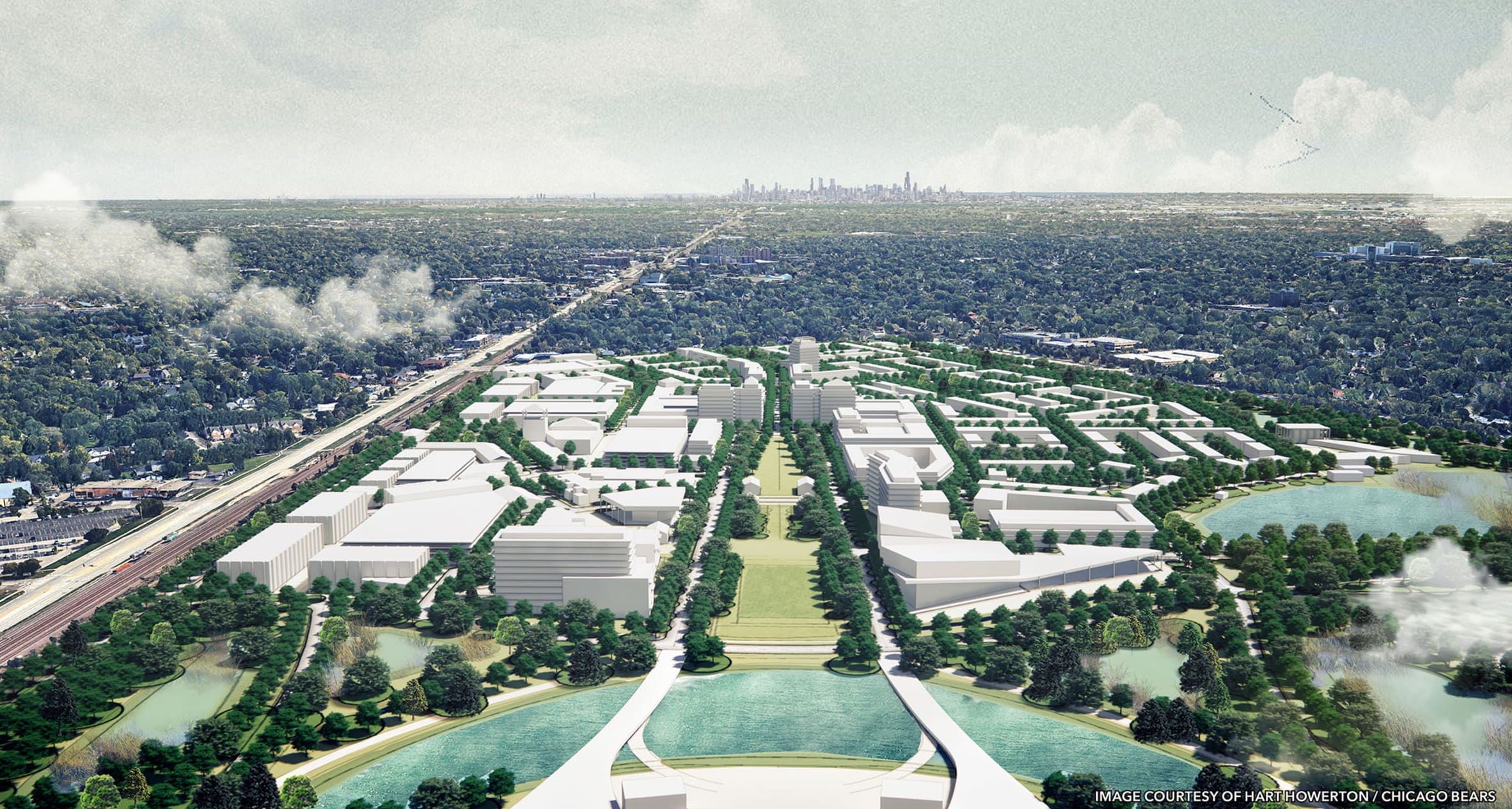
Who’s going to pay for the Chicago Bears stadium?
According to the Bears, its Arlington Heights plan would not call for public funding for direct stadium structure construction. The organization left open the possibility of seeking public funds to assist with the development of the other portions of the development.
The team believes that any public investment is money well spent given the short-term and ongoing benefit to the Chicagoland community, Cook County, and the state of Illinois. The Bears stated: “Construction of the proposed project is projected to create more than 48,000 jobs, result in $9.4 billion in economic impact for Chicagoland, and provide $3.9 billion in labor income to workers across the region, while the completed project will create more than 9,750 long-term jobs, result in $1.4 billion in annual economic impact for Chicagoland and provide $601 million in annual labor income to workers across Chicagoland. We also anticipate that the development will generate $16 million in annual tax revenue in addition to property taxes for Arlington Heights, $9.8 million for Cook County, and $51.3 million for the State of Illinois.”
Related Stories
Resiliency | Jun 24, 2021
Oceanographer John Englander talks resiliency and buildings [new on HorizonTV]
New on HorizonTV, oceanographer John Englander discusses his latest book, which warns that, regardless of resilience efforts, sea levels will rise by meters in the coming decades. Adaptation, he says, is the key to future building design and construction.
Sports and Recreational Facilities | Jun 16, 2021
Populous designs 9,000-seat stadium and training center for the Brisbane Lions
The project will include fields for public use.
Digital Twin | May 24, 2021
Digital twin’s value propositions for the built environment, explained
Ernst & Young’s white paper makes its cases for the technology’s myriad benefits.
Sports and Recreational Facilities | May 17, 2021
Indoor volleyball and basketball complex set for St. Louis
The project will be the largest youth volleyball and basketball facility in St. Louis.
Sports and Recreational Facilities | May 11, 2021
Total Quality Logistics Stadium completes in Cincinnati
Populous designed the project.
Sports and Recreational Facilities | Apr 27, 2021
Populous completes Phase II of renovations at Georgia Tech’s Mac Nease Baseball Park at Russ Chandler Stadium
The project includes a new, year-round elite training facility.
Sports and Recreational Facilities | Apr 9, 2021
AdventHealth Training Center breaks ground in Orlando
HOK designed the project.
Sports and Recreational Facilities | Mar 26, 2021
Populous and SRG Partnership selected to transform Oregon State University’s Reser Stadium
Populous has recently release renderings of the project.
Market Data | Feb 24, 2021
2021 won’t be a growth year for construction spending, says latest JLL forecast
Predicts second-half improvement toward normalization next year.
AEC Tech | Dec 17, 2020
The Weekly show: The future of eSports facilities, meet the National Institute for AI in Construction
The December 17 episode of BD+C's The Weekly is available for viewing on demand.


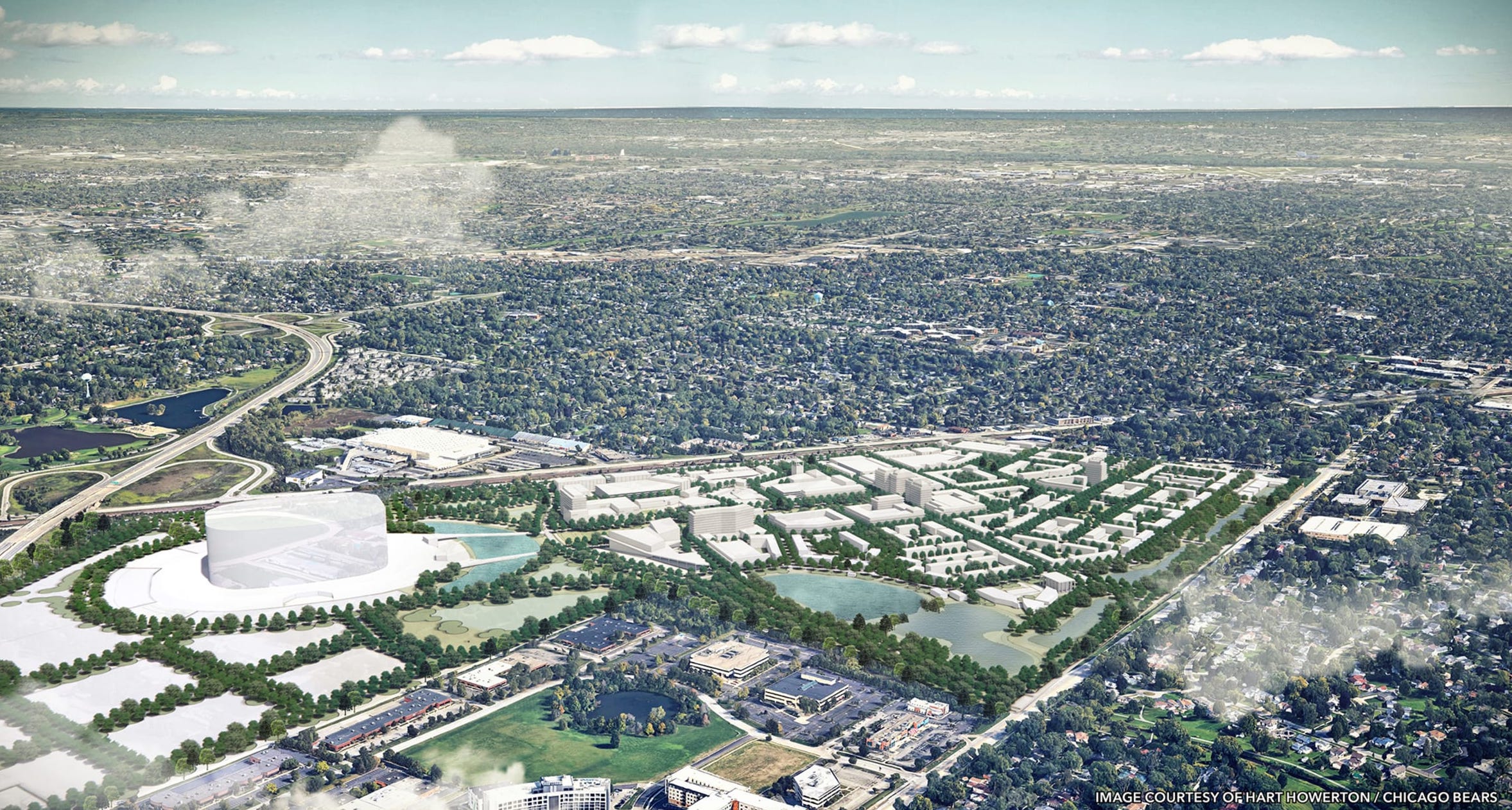
![Oceanographer John Englander talks resiliency and buildings [new on HorizonTV] Oceanographer John Englander talks resiliency and buildings [new on HorizonTV]](/sites/default/files/styles/list_big/public/Oceanographer%20John%20Englander%20Talks%20Resiliency%20and%20Buildings%20YT%20new_0.jpg?itok=enJ1TWJ8)
